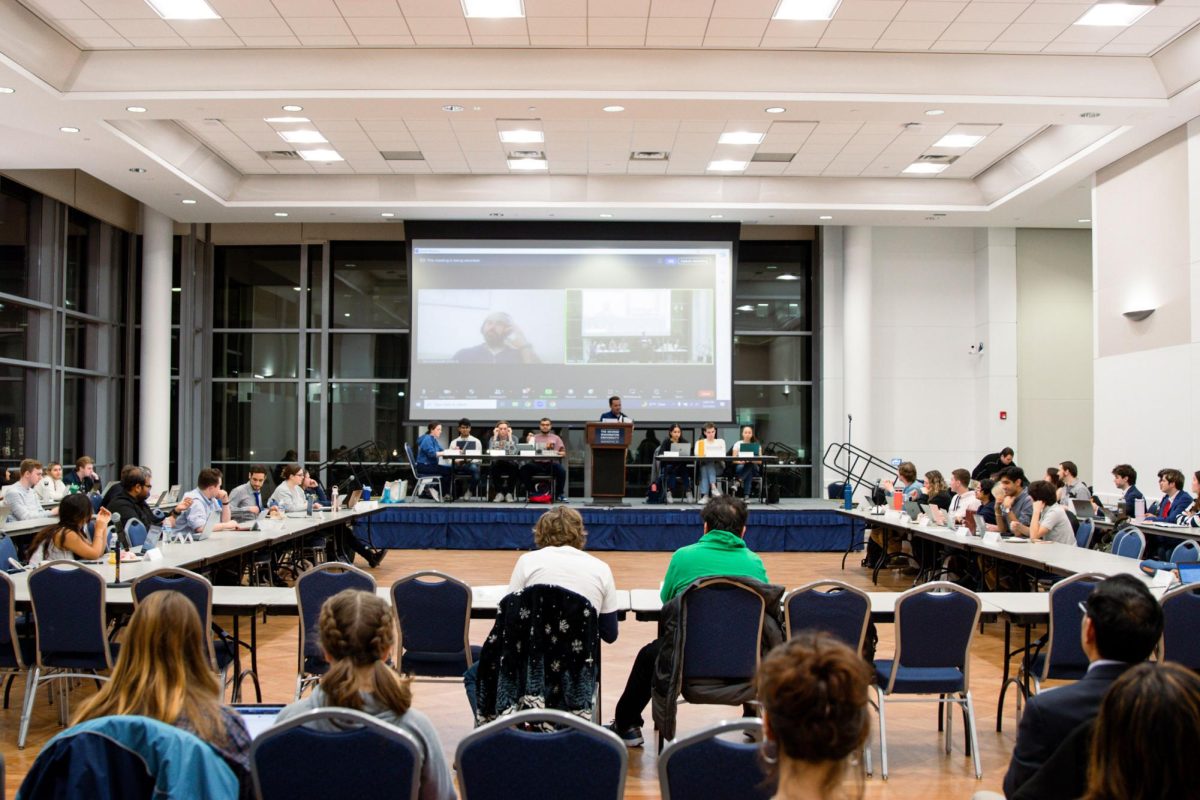Updated: Feb. 25, 2024, at 8:40 p.m.
The Student Government Association unanimously passed a bill Monday that will reform the Joint Elections Commission ahead of the upcoming SGA elections.
SGA Senate Chairperson Pro Tempore Amy Cowley said the Election Fairness Act will split the JEC into three governing branches. She said one branch will handle administrative matters of running the election, one branch will consider and create policy and the third branch will oversee judicial matters like candidate disqualifications.
The bill comes after students voted to reform the JEC’s charter in a referendum during last year’s SGA elections. The election season was marred by ballot disputes and three Student Court cases after the JEC disqualified a trio of candidates because of invalid petition signatures needed to qualify for their respective races.
The legislation will work to increase the “due process clause” of the U.S. Constitution because in previous years, those who were passing rules about the election were also enforcing them. She also said the new judicial branch will give students the option to appeal JEC rulings in a space other than the Student Court, which can take “quite a while.”
“This is intended to help the JEC reconcile more smoothly so that there aren’t as many holdups,” Cowley said.
Students voted last year to amend Article 13 of the SGA bylaws to restructure the JEC into an independent agency that administers SGA elections and enforces enacted election laws.
SGA Sen. Dan Saleem (CCAS-U), proposed a friendly amendment to randomize the ballot order for each electoral race because candidates listed at the top are more likely to receive votes than those on the bottom of the ballot.
Senators also unanimously passed a bill requesting the University add medical abortions to the services offered at the Student Health Center.
SGA Sen. Caroline Motley (G-at-Large) sponsored the Abortion Justice on Campus Act alongside Cowley and GW Reproductive Autonomy and Gender Equity Co-Presidents Maddy Niziolek and Stephanie Spector. Motley said medicated abortion is an “essential part” of reproductive healthcare communities around the country, particularly since the Supreme Court’s overturn of Roe v. Wade in 2022.
University officials have previously denied requests and a petitions created by GW RAGE to offer abortion pills in the SHC.
If administrators approve the SGA’s request, students would no longer be forced to seek abortion care off campus, Motley said. She added that medicated abortion at the SHC promotes the message that D.C. is a “safe haven” for abortion access.
“This will help decrease the stigma around abortion by demonstrating that it should not be treated as an exception to other services,” Motley said.
Hannah Chichester Downs, a graduate student and the public service engagement manager for the D.C. Abortion Fund, said during public comment that many students face barriers when seeking an abortion, like funding and transportation. Chichester Downs said students may choose not to attend classes or work to receive reproductive health care because the University does not offer medicated abortion on campus.
“Oftentimes the clinics will give you a price at the moment you make the appointment and the price can be anywhere from $500 to $1000 even for something as affordable as the medication,” Downs said.
SGA President Arielle Geismar and SGA Vice President Demetrius Apostolis voiced support for the bill, with Geismar describing herself as “unequivocally” and “unapologetically” pro-choice.
“I am incredibly appreciative of the folks fighting for reproductive access on GW campus,” Geismar said. “Reproductive health is wildly important to me and has been for my entire life.”
SGA Sen. Izzy Brophy (CCAS-U), the chair of the Special Committee on Dining, said officials plan moving forward to keep all dining facilities open until halfway through weeks that have a modified schedule, including finals week and spring break. She said facilities will then gradually close, beginning with retail locations like the University Student Center and District House, and ending with Thurston Hall.
“I, as well as the rest of the dining committee, are hopeful that these necessary changes will ensure that students have adequate access to dining facilities during all the periods of the semester, especially during the finals period, where good nutrition is a prerequisite to academic success,” Brophy said.
Senators also filled five vacant senate seats by approving Joseph Migliorisi and Diego Gonzalez to fill two GWSB-U seats, William Thomas Smith Jr. for a GWSB-G seat, Eleanore Yarbrough for a GSEHD-G seat and Chaitanya Aggarwal for a SEAS-G seat.
Senators also approved Neil Sairam as chief counselor to the SGA Senate, concurrent with his current deputy CoS position, after former chief counselor Henry Mills resigned Monday. Senators also approved Alexia Creeden as the assistant counselor to the senate, Connor Linggi as Legislative Budget Office junior director and Isabella Hansen as director of community engagement.
Senators also approved Andrés Orejuela, Aryan Mirchandani and Dylan Richards as Legislative Budget Office advisers, and voted for SGA Sen. Saahil Qureshi Shaik to fill the Graduate Education Policy Chair after former SGA Sen. Adriana Sandoval resigned.
Vice Provost for Graduate and Postdoctoral Affairs Suresh Subramaniam and Program Associate Stephanie Anderson also introduced the SGA to the office, which aims to create more social and professional development opportunities for graduate students, according to Anderson. Anderson asked the SGA for help creating a graduate student handbook as well as an SGA liaison to share updates from the OGPA office.
“I would love if we could find one to three graduate student ambassadors that can meet with me monthly so that I can also stay in the loop of programming that you all want, whether it’s events, or keeping up to date with policies,” Anderson said.
This post was updated to correct the following:
The Hatchet incorrectly reported that the bill will divide the JEC into two branches. It will divide the JEC into three branches. We regret this error.





